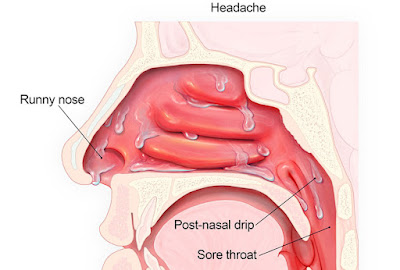What Is Cold And Flu? Symptoms And Treatments
What is a cold and the flu?
Colds and flu (flu) are infections of the upper respiratory tract - nose, mouth, throat and lungs. Infections are caused by viruses.
How do I know if I have a cold or the flu?
Fever and illness have many of the same symptoms. However, cold symptoms are usually weaker than the symptoms and develop more slowly.
Washing your hands regularly, getting enough rest, eating a healthy diet, drinking plenty of fluids, avoiding close contact with sick people, and carrying a shotgun can help reduce your risk of colds and flu. Medications can help relieve symptoms such as fever, pain, and cough.
READ ALSO: What's Prostate Cancer, Symptoms And Treatments
What are the symptoms of colds and flu?
Symptoms of Colds and Flu
| Symptom | Cold | Flu |
|---|---|---|
| Fever | Adults-rare; children- sometimes | High fever (100°F and higher; can last 3 to 4 days) |
| Runny nose | Common (Nasal discharge may have a yellow- or green-colored tint) | Sometimes |
| Stuffy nose | Common | Sometimes |
| Headache | Sometimes (usually mild) | Common |
| Body aches | Sometimes (usually mild) | Common (can be severe) |
| Fatigue | Sometimes (usually mild) | Common (can last up to 2-3 weeks) |
| Exhaustion | Never | Common (at the start of flu) |
| Chills, sweat | No | Common (extreme) |
| Nausea | Uncommon | Common |
| Loss of appetite | Sometimes | Common |
| Sneezing | Common | Sometimes |
| Cough | Common | Common (can be intense) |
| Sore throat | Common | Sometimes |
| Chest congestion, discomfort | Common (mild to moderate) | Common (can be severe) |
| Watery eyes | Common | Sometimes |
Can colds and flu be “cured” with medication?
There is no cure for colds and flu. However, there are several over-the-counter medications that can relieve anxiety caused by cold and flu symptoms. In addition, there are drugs and vaccines that can treat and prevent the disease.
Note on antibiotics: Colds and flu are caused by proteins and cannot be cured with antibiotics. Antibiotics are used to treat bacterial infections such as throat and ear infections, skin and urinary tract infections. Using antibiotics for infections they cannot treat makes the antibiotics less effective for the infections they are supposed to treat (a condition called antibiotic resistance). Do not use antibiotics to treat colds and flu.
To relieve anxiety caused by specific cold and flu symptoms, consider using the following over-the-counter medications:
To reduce fever and pain - pain relievers: Acetaminophen (Tylenol®) is generally preferred. Ibuprofen (Advil®) or naproxen (Naprosyn®) are also often used. Aspirin should be avoided because of the risk of developing Reye's disease. (Reye's syndrome is a condition that affects all parts of the body and is especially harmful to the brain and liver.) Note on Acetaminophen: Read all signs of cold remedies. Do not take more than one medicine containing paracetamol. Taking too much acetaminophen can damage your liver. Acetaminophen doses should not exceed four grams per day. People with liver damage or liver problems should not take more than two grams of acetaminophen a day.
READ ALSO: What's Prostate Cancer, Symptoms And Treatments
Dry nose - antihistamines: Try an antihistamine such as diphenhydramine (Benadryl®). Because these products can make you drowsy, avoid driving and other complex activities while taking these medications. Loratadine (Claritin®), available (OTC), is a sleepless alternative, but it may not be as effective as other antihistamines in reducing cold and flu symptoms. Other over-the-counter antihistamines include Allegra®, Zyrtec® and Xyzal®.
To get rid of bloated stomach, nasal congestion - drink fluids: Try oral contraceptives such as pseudoephedrine (Sudafed®). However, insomnia, anxiety, and irritability can occur when taking these medications. Pregnant women or women with uncontrolled blood pressure should avoid pseudoephedrine products. Vaccines are often combined with other medications (especially antihistamines) in over-the-counter medications. A "-D" at the end of a drug's name means it includes oral contraceptives.
To relieve a stuffy nose or nasal congestion - nasal steroids: Medications such as fluticasone (Flonase®, available without a prescription) or mometasone (Nasonex®; prescription required) may relieve symptoms. These medications are also used for allergies. They are not the same as Afrin® or other over-the-counter nasal preparations. Antihistamines also help.
To make it easier to blow your nose or relieve coughing/phlegm production, wait: Try Guaifenesin (Robitussin®, Mucofen®, Humibid LA®, Mucinex®, Humibid E®). These products help eliminate the fine, discolored drainage that comes out of your nose and mouth.
To reduce cough - cough suppressants: Dextromethorphan can help reduce coughing.
To relieve a sore throat: Try throat lozenges (such as Cepacol®) or gargle with warm salt water several times a day. Pain relievers also help.
For other symptoms: Over-the-counter cold products (such as Nyquil® or Tylenol Cold & Sinus®) can provide great relief. Be sure to read product labels to find the best cold preparation to match your symptoms and to determine if that medicine is safe for you.
What are other ways to treat and prevent the flu?
Antiviral medications and an annual flu shot are available for the treatment and prevention of the flu.
READ ALSO: What's Prostate Cancer, Symptoms And Treatments
Prescription medications for the flu include amantadine (Symmetrel®), rimantadine (Flumadine®), zanamivir (Relenza®), and oseltamivir (Tamiflu®). These medicines don't cure the flu, but they can ease symptoms and make you feel better faster. They are only effective when used in the first 48 hours of flu-like symptoms.
These medications are not necessary for healthy people with the flu. They are generally reserved for people with severe flu illness (for example, those who are hospitalized) or those at risk of complications from the flu, such as people with long-term chronic medical conditions (such as diabetes or chronic obstructive pulmonary disease, asthma) or old age.
Influenza vaccine (by injection and nasal spray). Although there is currently no vaccine against the common cold, there is a vaccine to prevent the flu. The vaccine is available in both an injection and a nasal spray. It works by exposing the immune system to viruses. The body responds by developing antibodies (the body's defense system) against the flu. The flu shot contains killed flu viruses. The nasal spray contains live but weakened flu viruses. The nasal spray is only approved for healthy children and adults between the ages of 2 and 49 who are not pregnant.
To avoid
Who should get the annual flu shot?
The Centers for Disease Control (CDC) recommends that the following groups receive an annual flu shot between November and February (flu season):
All people older than six months.
It is especially important that some people at high risk for complications from the flu and those who have been in contact with people at high risk for complications receive the flu vaccine. These high-risk people include:
Residents of nursing homes and other long-term care facilities.
People with chronic medical conditions such as asthma, heart disease, diabetes, kidney and liver disease, and chronic lung disease.
People with weak immune systems, for example, people with cancer, HIV/AIDS, or chronic steroid use.
Family members and caregivers of patients at risk of flu complications.
Women who are pregnant or will become pregnant during the flu (regardless of trimester).
Health professionals who closely interact with patients in hospitals, nursing homes, long-term care facilities, and other health care facilities.
Infants and children 6 months to 18 years of age taking long-term aspirin. This puts these people at risk of developing Reye's syndrome after becoming infected with the flu.
American Indian/Alaska Native.
People who have close contact with children under the age of five, such as people who live with children, babysitters, and day care providers.
Morbidly obese people (body mass index of 40 or more).
Can I get the flu from a flu shot or nasal spray?
No, you cannot get the flu from a flu shot or nasal spray. However, some people can still get the flu even if they have the vaccine. In these cases, flu symptoms are milder than in people who have not been vaccinated against the flu.
What else can I do to prevent colds and flu?
Wash your hands often with soap and water or alcohol wipes. Cold and flu viruses are spread by touching your nose or mouth after touching an infected person, by breathing in air from an infected person's sneeze or cough, or by touching objects that come in contact with the virus and then he touches his nose.
TO LIVE TOGETHER
What can happen if you catch a cold or flu?
A worsening cold or flu can cause:
I have pneumonia.
Bronchitis.
Sinus infections
Ear infection.
Exacerbation of existing health problems such as asthma and congestive heart failure.
Complications from the flu can lead to hospitalization, life-threatening conditions, and even death.
When should I call my doctor?
Call if you have any of the following:
READ ALSO: What's Prostate Cancer, Symptoms And Treatments
Symptoms persist or worsen after 10 days.
Shortness of breath or difficulty breathing.
High temperature (above 102°F) for three or more days.
Pain or pressure in the chest.
coughing up blood
Sudden dizziness or fainting.
Severe vomiting.
Confusion, confusion.
Severe pain in the sinuses.
Swollen glands in the neck or jaw.




Comments